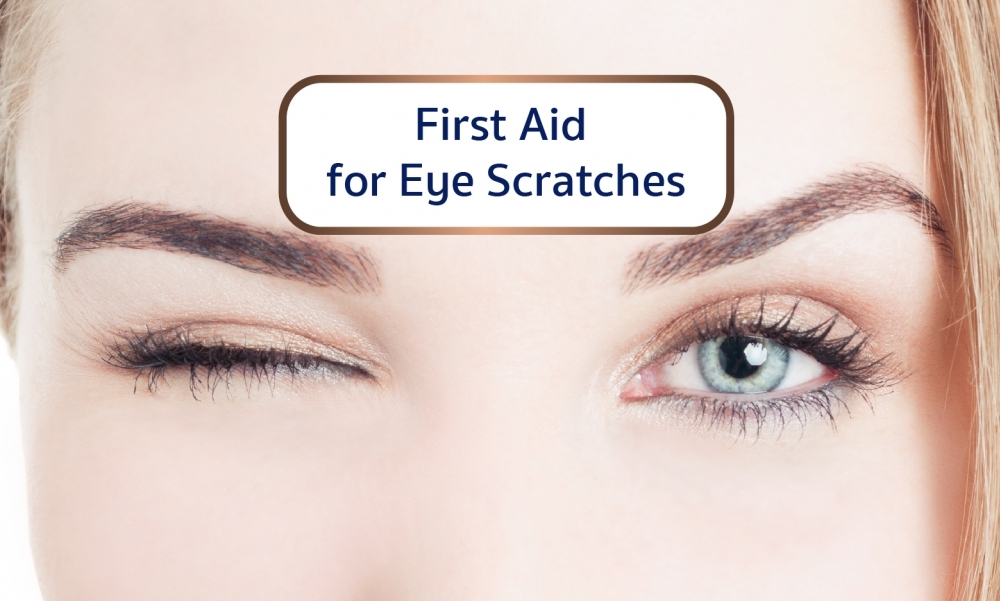First Aid for Eye Scratches
Housework and sports are two of the most common causes of eye injuries. But even cooking or playing with your dog or cat can get you a scratched eye. You might have symptoms right away or the symptoms may start or get worse hours after the injury.
Symptoms of an Eye Scratch
If the white part of your eye is scratched, you may see a spot of blood, a scratched line or an area of general redness on your conjunctiva or sclera.
Other common symptoms of a scratched eye include:
> Eye pain
> A feeling that something is stuck in your eye
> Tearing
If you scratch or scrape the cornea — the clear, round dome at the front of the eye, that covers the iris and pupil — this is called a corneal abrasion. If a corneal abrasion scars the cornea, it can permanently affect vision. Other corneal abrasion symptoms can include:
> Blurry vision
> Sensitivity to light
> Headache
How to Treat a Scratched Eye
See your ophthalmologist if you scratch your eye. If you're in a lot of pain, are having any trouble seeing or are worried about your eye, go to the emergency room.
Most corneal abrasions and eye scratches are minor and will heal on their own in a few days, but you should still see a doctor to get an eye exam.
Your ophthalmologist may treat an eye scratch with antibiotic eye drops or ointment. You may be given prescription steroid eye drops to reduce inflammation and reduce the chance of scarring. You may also be given lubricating eye drops to make you more comfortable.
There are no over-the-counter eye drops specifically for eye scratches. If you have scratched your eye, you shouldn't use any eye drops without asking a doctor first.
If you have a scratched eye, here are some things you should—and should not—do:
> DO rinse your eye with saline solution or clean water.
If you don't have an eyecup, use a small, clean glass. Rest the rim of the glass on the bone at the base of your eye socket,
below your lower eyelid.
The water or saline solution may flush the foreign object from your eye.
If you don't have an eyecup, use a small, clean glass. Rest the rim of the glass on the bone at the base of your eye socket,
below your lower eyelid.
The water or saline solution may flush the foreign object from your eye.
> DO blink.
Blinking can help get rid of small bits of dust or sand in your eye.
Blinking can help get rid of small bits of dust or sand in your eye.
> DO pull your upper eyelid over your lower eyelid.
The lashes from your lower eyelid may be able to brush away any foreign object caught underneath your upper eye lid.
The lashes from your lower eyelid may be able to brush away any foreign object caught underneath your upper eye lid.
> DO wear sunglasses.
If your eye is sensitive to light because of the scratch, sunglasses will make you more comfortable while you heal.
If your eye is sensitive to light because of the scratch, sunglasses will make you more comfortable while you heal.
> DON'T rub your eye.
Rubbing your eye can make the scratch worse.
Rubbing your eye can make the scratch worse.
> DON'T touch your eye with anything. Fingers, cotton swabs and other objects won't help remove any foreign objects and could hurt your eye more. The object that caused the scratch may be gone even though you still feel like something is in your eye.
> DON'T wear your contact lenses. Wearing your contact lenses will slow the healing process and could cause complications, like contact lens-related infections.
> DON'T use redness-relieving eye drops. Over-the-counter redness-reducing eye drops can be painful if you have an eye scratch and they won’t help you heal any faster.
Healing Time for an Eye Scratch
You ophthalmologist can tell you what to expect after they've examined your eye. Eyes often heal very quickly, so an eye scratch may heal faster than a cut on your skin would. But each scratch is different and there’s no way to predict exactly how long it will take for an eye scratch to heal.
Ask your ophthalmologist how long you might be in pain, how long to take any medications that they prescribe and whether there are any activities you should avoid while you’re healing. If your symptoms go on for longer than the doctor told you to expect—or get worse—you should get in touch with your doctor to find out what to do next.
Information from American Academy of Ophthalmology
 02-056-3333
02-056-3333





